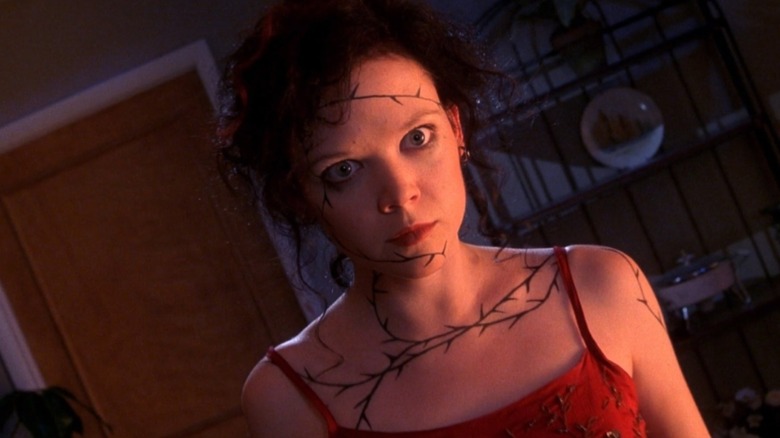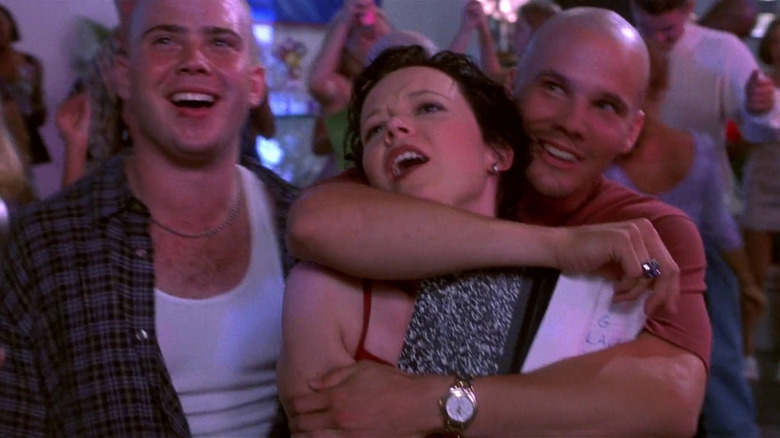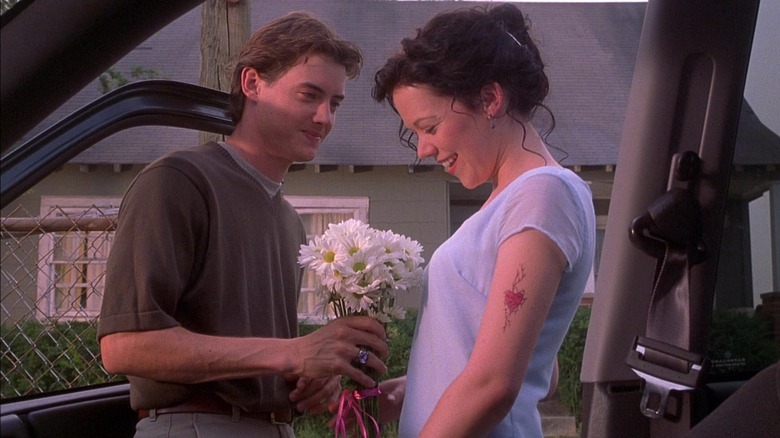How A Largely Forgotten Stephen King Movie Sequel Does What The Original Never Could
Stephen King's books are frequently adapted into successful movies, but Hollywood often expands on the worlds King has created with original sequels that are bizarre or poorly written. One of the worst examples are the "Children of the Corn" movies, which mushroomed from an adaptation of King's single short story into a hackneyed 11-film saga. Likewise, films such as "Return to Salem's Lot" and "Pet Sematary" use Stephen King's name and established concepts to lure audiences in, but they pale in comparison to his prolific originals.
One of the exceptions to the rule is "The Rage: Carrie 2." Initially called "The Curse," Rafael Moreu's screenplay had nothing to do with Stephen King's masterful debut, but then shoehorned elements of Carrie White lore into the storyline (via Fangoria). The protagonist, Rachel Lang, is Carrie's secret half-sister and shares her telekinetic abilities. However, she is not as much of a social pariah as Carrie White, originally inspired by two of Stephen King's classmates, one who wore the same clothes every day and another who had an overly religious mother. Sue Snell, who felt sympathy for Carrie, is now the guidance counselor at Rachel's high school.
While "The Rage: Carrie 2" shares a similar ending to "Carrie" where Rachel gets revenge on her peers, it tackles more than the damages of bullying. The sequel focuses on larger, systemic issues that are far more insidious: the harmful effects jock culture and toxic masculinity has on young women. Opening with the tragic suicide of Rachel's best friend, who is revealed to be a victim of sexual exploitation by a popular athlete, "The Rage: Carrie 2" is a much grittier look at contemporary teenage life.
The bullies are sexual predators
According to Fangoria, "The Rage: Carrie 2" was inspired by the real-life Spur Posse, a group of male high schoolers who categorized their assaults of underage girls with points. While the bullies in Brian De Palma's adaptation of "Carrie" are certainly cruel and their actions deeply traumatizing — throwing tampons at Carrie, tricking her into going to prom with Tommy, and dumping pig's blood on her — these are immature pranks. In "The Rage: Carrie 2," the bullies are actual predators who manipulate young girls into having sex, often for the first time, then callously discard them.
They brag about how they purposefully shower these girls with affection and the promises of a committed relationship, even though they regard them as nothing more than a "pump" or a "nut." The football players have zero respect for these women and the deep feelings they often harbor. The boys joke that their idea of love is just "fifteen seconds of squishing noises." As a result of their vicious treatment, Rachel's best friend throws herself off the school roof, while many others are left emotionally devastated. When Sue Snell tells the football coach about this epidemic of despondent girls, he brushes it off, insisting that there is "nothing illegal about breaking a girl's heart."
"The Rage: Carrie 2" has a larger scope than the original "Carrie," depicting how men in power keep the wheels of misogyny turning. The football players are easily able to shrug off any statutory rape charges because it would be too "damaging" for their sports career. This brings to mind countless true cases, such as Brock Turner, where young men's athletic success mattered more than the sexual crimes they committed. The scene gives "The Rage: Carrie 2" significant real-world impact.
Revenge porn ignites the killer finale
"The Rage: Carrie 2" builds up to the climax at a house party where the jocks share a secretly recorded videotape of Rachel's first sexual experience. In many ways, it is even more disturbing than the famed pig's blood sequence. Displaying such a vulnerable and intimate moment for the entire class to see is such an egregious invasion of privacy and truly stomach-churning. Sadly, this type of revenge porn has become even more commonplace, especially with internet and social media.
A key difference between "Carrie" is that Tommy and the rest of the school are initially horrified by the pig's blood, and much of the laughter is in Carrie's head, self-fulfilling her mother's prophecy, "They're all going to laugh at you." In "The Rage: Carrie 2," the bullies genuinely delight in exposing Rachel's most intimate moment, laughing giddily and forcing her to keep watching. The ending feels even more tragic than "Carrie" because we learn that Rachel had everything she ever wanted; the video reveals her crush, Jesse, whispering "I love you" to her while she sleeps. He had no part in this cruel prank and sincerely cared for her.
"The Rage: Carrie 2" was unfairly maligned by critics upon its release for its repetitive formula and threadbare connections to Stephen King's original "Carrie." However, unlike many non-Stephen King-authored sequels, it is thought-provoking and timely, offering a sharp perspective on rape culture and how it affects countless young women. "The Rage: Carrie 2" remains uncomfortably true to life, even more so than Stephen King's "Carrie," in its bold confrontation of toxic masculinity. The film is not afraid to depict machismo as it really is: heartless and pervasive.


